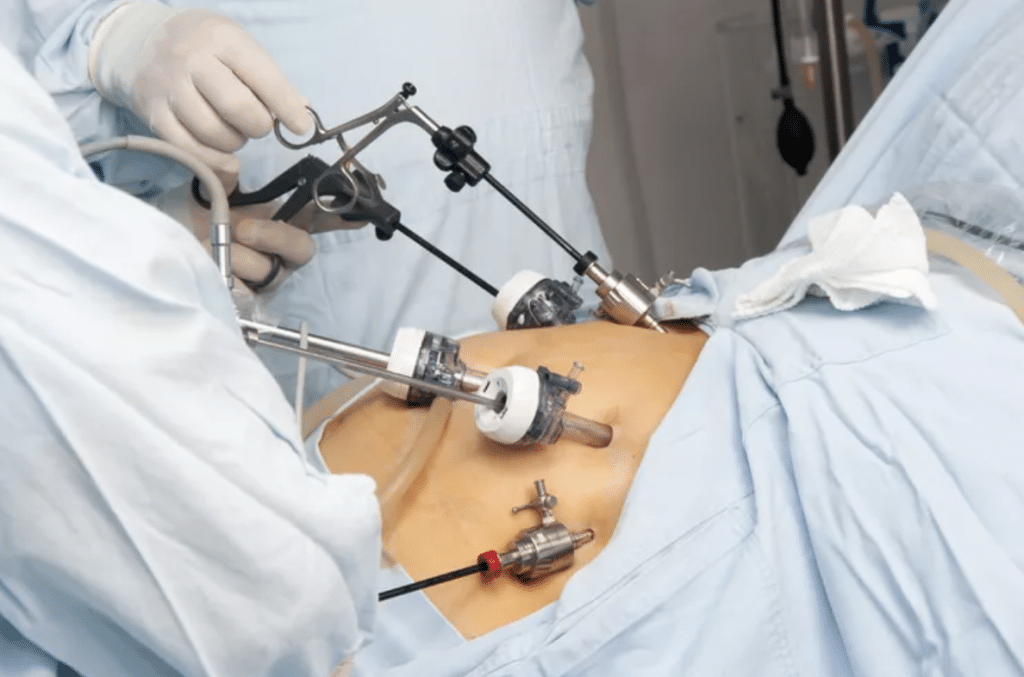Gastric bypass and other weight-reduction treatments, known as bariatric surgery, alter the digestive tract to aid in weight loss. These surgeries are often performed when diet and exercise have failed, or health issues arise due to weight. Some treatments limit food intake or reduce nutrient absorption capacity.
While bariatric surgery offers many benefits, all forms of weight-loss surgery are major surgeries with significant risks and adverse effects. Furthermore, to guarantee the long-term success of bariatric surgery, you must adopt permanent, healthy dietary changes and exercise regularly.
The Different Types of Bariatric Surgery
Every type of bariatric surgery has perks and drawbacks. Set an appointment with your healthcare provider to talk with them. The most common types of bariatric surgery include:
Roux-en-Y Gastric Bypass
Gastric bypass surgery is a common procedure that involves creating a pouch in the stomach’s top, allowing only one ounce of food to be taken in one sitting. The surgeon then cuts the small intestine and sews a section into the pouch, allowing food to enter the pouch and avoid the stomach and first segment of the small intestine, instead entering the middle region.
Sleeve Gastrectomy
Sleeve gastrectomy removes 80% of the stomach, creating a tube-like pouch with less food capacity and less appetite-regulating hormone, ghrelin. Benefits include weight reduction, no intestinal rerouting, and shorter hospital stays. This treatment is associated with a shorter hospital stay than most other surgeries.
Biliopancreatic Diversion With Duodenal Switch
The surgery involves two stages: a sleeve gastrectomy, a duodenal switch, and biliopancreatic diversion. The first stage involves a similar procedure, while the second involves a duodenal switch and biliopancreatic diversion, restricting food consumption and nutrient absorption and potentially causing food and vitamin shortages.
The most beneficial bariatric surgery depends on your specific situation, considering factors like BMI, eating habits, health issues, past surgeries, and associated risks, which your surgeon will evaluate and decide on.
When Should You Think About Bariatric Surgery?
Individuals who are very obese (body mass index greater than 40) or have more significant health concerns such as diabetes or heart disease are frequently suitable for bariatric surgery.
You might choose bariatric surgery after trying all the other options. The first stage is generally to experiment with adjustments to what you eat and drink and your regular activity and exercise routine. Some medications may assist individuals in losing weight. Surgery is usually considered only after all other alternatives have been exhausted.
The Benefits of Bariatric Surgery
There are numerous benefits to undergoing bariatric surgery, including:
- Increased longevity. Obese people who have bariatric surgery have a lower chance of death than obese people who do not.
- Improved obesity-related conditions. Obesity-related problems such as high blood pressure, sleep apnea, asthma, and others are improved or treated in most bariatric surgery patients.
- Increased metabolism. Physical activities like swimming, walking, and cycling aid in weight loss by promoting fat burning and reducing hormone production, thus reducing body fat accumulation.
- Better life quality. Bariatric surgery patients have a higher quality of life, including enhanced mobility, less melancholy and anxiety, improved confidence, social connections, and sexual function.
What Should You Do After the Surgery?
Following a post-operative bariatric surgery regimen is crucial for long-term weight reduction and health benefits, with criteria varying depending on the surgery type. Consult your surgeon for advice on fundamental steps.
- Follow Your Surgeon’s Post-Operative Instructions: Your surgeon will give you specific post-operative instructions. It is critical to strictly adhere to these directions, which include food advice, exercise limitations, and medication requirements.
- Dietary Progression: Over the course of many weeks, your diet will evolve from clear liquids to full liquids and, finally, solid meals. Follow the diet plan exactly and avoid consuming solid meals until your healthcare provider gives you the okay.
- Maintain Adequate Hydration: Adequate hydration is critical. To minimise overeating, sip water throughout the day and avoid drinking with meals.
- Check Your Nutritional Intake: Make sure you’re getting enough nutrients. Because bariatric surgery might cause dietary shortages, your healthcare practitioner may advise you to take supplements.
- Physical Activity: Enhance your physical activity gradually, as directed by your healthcare provider. You’ll begin with modest activity, such as walking, and then advance to more intensive exercise.
- Regular Follow-Up Appointments: Attend all follow-up visits with your surgeon and healthcare team on a regular basis. These sessions are critical for evaluating your progress and adjusting your treatment plan as needed.
- Support Groups: Consider joining a bariatric surgery support group. These organisations may provide emotional support as well as significant insights from individuals who have had similar experiences.
- Behavioural modifications: While bariatric surgery may help with weight reduction, it is also necessary to undertake long-term lifestyle modifications. Develop healthy eating habits, portion control, and stress management skills.
- Emotional and psychological support: Losing weight may result in emotional and psychological changes. If you’re suffering in certain areas of your journey, get help from a therapist or counsellor.
In Summary
Overall, bariatric surgery may be an effective technique for considerable weight reduction and improved health. However, it’s important to thoroughly explore your alternatives and collaborate with your healthcare physician to establish if the surgery is best for you. Bariatric surgery, with the proper preparation and support, may help you embrace a new lease on life and reach your weight reduction objectives.

